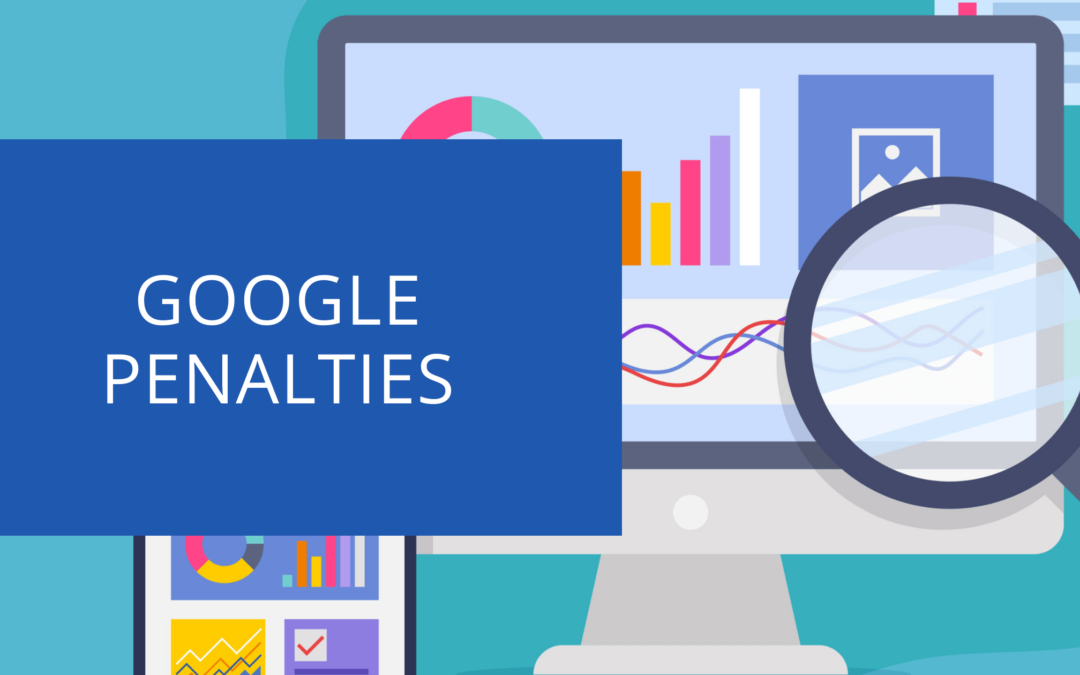Google penalties can be a business owner’s worst nightmare. Suddenly, your website traffic plummets and you have no idea what happened. You may have been hit with a Google penalty. In this article, we will discuss what Google penalties are, how to avoid them, and how to recover from them if you’ve already been penalised.
Contents
Top reasons for Google penalties and what causes them
Unnatural or poor links to your site
Unnatural or poor links to your site are one of the top reasons for Google penalties. You can prevent this by ensuring that all of your links are high-quality and relevant to your site.
You may be in danger of an unnatural or poor links penalty if you are doing any of the following:
- Participating in link schemes, such as buying or selling links, exchanging them with other sites, or participating in link exchanges
- Building links using automated methods, such as blog commenting programs or article spinning
- Engaging in reciprocal linking with unrelated websites
- Creating low-quality links, such as using excessive keywords in anchor text or stuffing your website with irrelevant links
Thin Content With Little or No Added Value
Another common reason for Google penalties is thin content with little or no added value. This can be prevented by ensuring that your website has high-quality, valuable content.
You may be in danger of a thin content penalty if you are doing any of the following:
- Duplicate content
- Copying and pasting articles from other websites
- Publishing low-quality or irrelevant content
- Low word count
Hidden text and links
![]() Hidden text and links are another common reason for Google penalties. This can be prevented by ensuring that your website’s code is clean and free of any hidden text or links.
Hidden text and links are another common reason for Google penalties. This can be prevented by ensuring that your website’s code is clean and free of any hidden text or links.
You may be in danger of a hidden text penalty if you are doing any of the following:
- Hiding text or links in your website’s code
- Using excessive keywords in your website’s content
- Making text the same colour as the background colour
User-generated spam
User-generated spam is another common reason for Google penalties. This can be prevented by ensuring that your website’s comments section is moderated and free of spam.
You may be in danger of a user-generated spam penalty if you are doing any of the following:
- Allowing users to post comments on your website without moderation
- Allowing users to post links in your website’s comments section
- Aren’t using the nofollow attribute on outgoing links posted by users
Keyword stuffing
Keyword stuffing is another common reason for Google penalties. This can be prevented by ensuring that you only use keywords sparingly and naturally in your content.
You may be in danger of a keyword stuffing penalty if you are doing any of the following:
- Stuffing keywords in your website’s title tag
- Stuffing keywords in your website’s meta tags
- Stuffing the same keyword multiple times on a single page
Hacked website
If your website is hacked, you may be penalised by Google. This can be prevented by ensuring that your website is secure and up to date.
You may be in danger of a hacked website penalty if you are doing any of the following:
- Not using strong passwords
- Not updating your website’s software and plugins regularly
Schema markup
This can be prevented by ensuring that your website’s schema markup is correctly implemented.
You may be in danger of a schema markup penalty if you are doing any of the following:
- Not using the correct schema markup for your website’s content
- Using review schema markup for self-promotion
Sneaky redirects
 Sneaky redirects are another common reason for Google penalties. This can be prevented by ensuring that your website’s code is clean and free of any sneaky redirects.
Sneaky redirects are another common reason for Google penalties. This can be prevented by ensuring that your website’s code is clean and free of any sneaky redirects.
You may be in danger of a sneaky redirect penalty if you are doing any of the following:
- Redirecting users to other websites without their consent
- Redirecting users to spammy or dangerous websites
Doorway pages
Doorway pages are another common reason for Google penalties. This can be prevented by ensuring that your website’s code is clean and free of any doorway pages.
You may be in danger of a doorway page penalty if you are doing any of the following:
- Creating pages that are only used to rank for specific keywords
- Creating pages that are only used to funnel traffic to other websites
Pure spam
Pure spam is another common reason for Google penalties. This can be prevented by ensuring that your website’s content is valuable and relevant.
You may be in danger of a pure spam penalty if you are doing any of the following:
- Publishing low-quality or irrelevant content
- Publishing duplicate content
What are algorithmic penalties?
Algorithmic penalties are penalties that are applied by Google’s algorithms. They are usually the result of algorithm changes or updates.
What are manual penalties?
Manual penalties are penalties that are applied by Google’s human reviewers. They are usually the result of violations of Google’s webmaster guidelines.
How to fix an algorithmic Google penalty
If you’ve been hit with an algorithmic Google penalty, the best way to fix it is to figure out which algorithm change caused the penalty and then make the necessary changes to your website.
What are the consequences of a Google penalty?
The consequences of a Google penalty can be devastating. Your website traffic will likely plummet, and you may lose ranking in Google’s search results. You may also lose revenue and customers.
How to fix a manual Google penalty
If you’ve been hit with a manual Google penalty, you will receive a notification in Google search console with the type of penalty you have been given. The best way to fix it is to identify what caused the penalty and then make the necessary changes to your website. Then submit a reconsideration request.
To submit a reconsideration request, you will need to do the following:
- Step One: Login to your Google search console account.
- Step Two: Click on “Manage Site.”
- Step Three: Under “Pending Actions,” click on “Request a Review.”
- Step Four: Enter the requested information and hit “Submit.”
What can cause a Google penalty?
 Google’s Webmaster guidelines include the main types of violations that can lead to a penalty:
Google’s Webmaster guidelines include the main types of violations that can lead to a penalty:
- Automatically generated content: Automatically generated content is created by software, such as a spambot, and can include large amounts of copied content or low-quality content.
- Sneaky redirects: Sneaky redirects are redirection tricks used to mislead users or search engines, for example, by disguising affiliate links as navigation links.
- Link schemes: A link scheme includes unnatural links intended to manipulate search results.
- Thin content: Thin content is low quality text that provides little or no value to users. It can be difficult for a website visitor to understand why the page exists and what it offers.
- Paid links: Paid links are links exchanged for money or other compensation.
- Cloaking: Cloaky pages are designed to display different content for users and search engines.
- Hidden text and links: Hiding text or links can be done by making them the same colour as the background or making them very small.
- Doorway pages: Doorway pages are sites or pages created to rank for specific, similar search queries which can lead to multiple similar pages in the search results, where each result ends up taking the user to essentially the same destination.
- Scraped content: Scraped content is copied from other websites without adding any original value.
- Affiliate programmes: Penalties for affiliate programmes can be for sites or pages that offer no value to users.
- Irrelevant keywords: Irrelevant keywords covers keyword stuffing.
- Creating pages with malicious behaviour: This includes hacked pages, malware, and phishing schemes.
- Automated queries: Google can penalise sites that send automated queries to their servers.
- User-generated spam: Google can penalise sites that have too much user-generated content that is spammy.
Google Penalties FAQ
What are the consequences of a Google penalty?
The consequences of a Google penalty can be devastating. Your website traffic will likely plummet, and you may lose ranking in Google’s search results. You may also lose revenue and customers.
How do I know if I’ve been hit with a Google penalty?
If your website has seen a sudden drop in web traffic, it’s possible that you’ve been hit with a Google penalty. You can check your site’s clicks and impressions from search in Google Search Console, you may have lost ranking because of a penalisation. Another way to tell is if you received a notification in Google Search Console about a manual penalty.
How do I fix a Google penalty?
 The best way to fix a Google penalty is to identify and correct the issue that caused the penalty. If it was a manual penalty, once you’ve made the necessary changes, you can submit a reconsideration request. If it was an algorithmic penalty, you will have to wait for Google to reassess your site and its changes.
The best way to fix a Google penalty is to identify and correct the issue that caused the penalty. If it was a manual penalty, once you’ve made the necessary changes, you can submit a reconsideration request. If it was an algorithmic penalty, you will have to wait for Google to reassess your site and its changes.
What are some common causes of Google penalties?
Some of the most common causes of Google penalties are spammy links, low-quality content, doorway pages, and hacked websites.
Is there a way to prevent Google penalties?
Yes. You can avoid Google penalties by following the Google Webmaster Guidelines and keeping your website up to date with the latest changes made to Google’s algorithm. You should also be wary of black-hat SEO techniques that could lead to a penalty.
What are the Google’s Webmaster Guidelines?
The Google Webmaster Guidelines are a set of instructions that webmasters can follow to ensure their website complies with Google’s terms and conditions. violating these guidelines can lead to a Google penalty.
What is the process for recovering from a Google penalty?
The first step in recovering from a Google penalty is identifying the issue that caused the penalty. If it was a manual penalty and you’ve fixed the issue, you can submit a reconsideration request using your Google search console account. If your site meets all of Google’s guidelines, your request will be approved and your site will be reinstated in Google’s search results. If you discover it could be an algorithmic penalty and you’ve fixed the issue, you will need to wait for Google to reassess your site.
What is Google Search Console?
Google Search Console is a free online tool that provides webmasters with information about their website’s visibility in Google search results. It also allows webmasters to submit and check for manual penalties, and request reconsideration of a site if it has been penalised.
We Offer SEO Services Nationwide
- Chester:https://mediakynect.co.uk/seo-chester/
- Wirral: https://mediakynect.co.uk/seo-wirral/
- Liverpool: https://mediakynect.co.uk/seo-liverpool/
- North Wales: https://mediakynect.co.uk/seo-north-wales/
- Wrexham: https://mediakynect.co.uk/seo-wrexham/
Conclusion
Google penalties can be devastating for your website. The best way to avoid them is to ensure that your website is up to date and follows Google’s Webmaster guidelines. If you’ve been hit with a penalty, the best way to fix it is to identify the cause of the penalty and make the necessary changes to your website.

